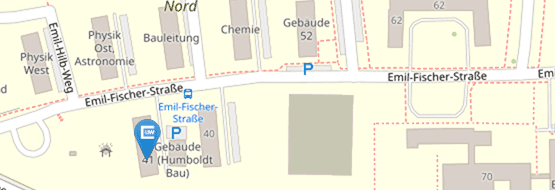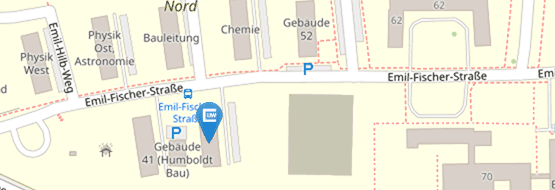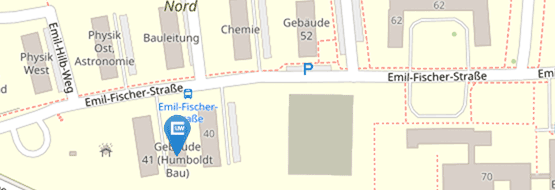Projekte
Projektleiter - Project Manager: Prof. Dr. Alfio Borzì
Beteiligte Wissenschaftlerinnen und Wissenschaftler - Participating scientists: Prof. Dr. Giovanni Manfredi, Prof. Dr. Paul-Antoine Hervieux, Dr. Jan Bartsch
Laufzeit - Project period: 05.2025 - 12.2025
Förderinstitution - Funding institution: Bayerisch-Französisches Hochschulzentrum (BayFrance)
Genehmigungssumme - Funding amount: 3.880,00 €
Genehmigungsdatum - Granting date: 14.05.2025
Förderkennzeichen - Funding number: FK-29-2025
Projektbeschreibung:
Ziel dieses Projekts ist die Formulierung und Anwendung eines mathematischen Rahmens zur Modellierung, Simulation und optimalen Steuerung von Vlasov-Poisson-Systemen, bei denen die Steuerung durch ein externes Magnetfeld erfolgt.
Solche Systeme beschreiben die zeitliche Entwicklung eines Plasmas unter Berücksichtigung der selbstkonsistenten elektrischen Felder. Während bereits erheblicher Aufwand in die Modellierung und numerische Lösung dieser Gleichungen investiert wurde, ist das Gebiet der optimalen Steuerung und Gestaltung von Plasmen innerhalb kinetischer Modelle unter Anwendung von Monte-Carlo-Methoden bislang weitgehend unerforscht.
Unsere Hauptanwendung ist die schnelle Kühlung nicht-neutraler Plasmen – ein Prozess von großem Interesse für experimentelle Gruppen. Solche Plasmen können über lange Zeiträume in elektromagnetischen Fallen eingeschlossen werden, und die Kühlung erfolgt üblicherweise durch eine adiabatische Verringerung der effektiven Steifigkeit der Falle. Ziel dieses Projekts ist die Herleitung einer optimalen Steuerungsstrategie, mit der das Plasma deutlich schneller als im adiabatischen Zeitmaßstab gekühlt werden kann. Hierzu soll ein Funktional minimiert werden, das die Abweichung vom gewünschten Endzustand misst.
Zu diesem Zweck entwickeln wir Monte Carlo Methoden in Kombination mit gradientenbasierten Optimierungstechniken zur Lösung des resultierenden kinetischen Steuerungsproblems. Die auf diese Weise gewonnenen optimalen Kühlprotokolle sollen konventionelle lineare Strategien übertreffen und zu kälteren sowie stabileren Endzuständen führen.
Dieses Projekt ist sowohl in seiner mathematischen Modellierung als auch in der Anwendung auf konkrete Herausforderungen der Plasmaphysik innovativ. Es bietet darüber hinaus den Nachwuchswissenschaftlern wertvolle Möglichkeiten zur Sichtbarkeit in der Fachgemeinschaft und zur Stärkung ihrer Kollaborationen und ihres internationalen Forschungsnetzwerks
Projektpartner - Project Partners:
Prof. Dr. Bernadette Hahn (Verbundkoordinatorin) – Lehrstuhl OIP Inverse Probleme , Universität Stuttgart
Prof. Dr. Alfio Borzì – Lehrstuhl für Wissenschaftliches Rechnen, JMU Würzburg
Prof. Dr. Andreas Maier, Lehrstuhl für Mustererkennung, FAU Erlangen-Nürnberg
Prof. Dr. Herbert Köstler und Priv.-Doz. Dr. Tobias Wech, Experimentelle Radiologie, Universitätsklinikum Würzburg
Prof. Dr. Thorsten Bley, Institut für Diagnostische und Interventionelle Radiologie, Universitätsklinikum Würzburg
Dr. Moritz Berger, Siemens Healthcare GmbH, Erlangen
Prof. Dr. Karsten König und Dr. Andreas Schindele, JenLab GmbH, Berlin
Laufzeit: - Project period: 04.2020 - 03.2023
Förderinstitution: - Funding institution: Bundesministerium für Bildung und Forschung (BMBF)
Genehmigungssumme - Funding amount: 260.000,00 €
Genehmigungsdatum - Granting date: 11.2019
Förderkennzeichen - Funding number: 05M20WWB
Projektbeschreibung:
Das Projekt untersucht den Einsatz und die Weiterentwicklung von Methoden des maschinellen Lernens zur MR-Bildrekonstruktion und zur Klassifikation von Leberläsionen. Basierend auf einem Vergleichsmodell und datengetriebenen Bildrekonstruktionsmethoden sollen diese systematisch verknüpft werden, um eine hohe Beschleunigung zu ermöglichen, ohne den diagnostischen Wert zu beeinträchtigen. Neben der Gestaltung geeigneter Netzwerke soll auch untersucht werden, ob Metadaten (z.B. Alter des Patienten) in die Rekonstruktion einbezogen werden können.
Darüber hinaus sollen geeignete Klassifikationsalgorithmen auf einer Bildbasis entwickelt und das Potential einer direkten Klassifikation auf den Rohdaten untersucht werden. Langfristig kann eine intelligente MR-Diagnostik die Effizienz des Einsatzes von MR-Hardware deutlich erhöhen, eine bessere Patientenversorgung gewährleisten und neue Impulse in der Medizintechnik setzen.
Projektleiter - Project Manager: Prof. Dr. Alfio Borzì
Beteiligte Wissenschaftlerinnen und Wissenschaftler - Participating scientists: Prof. Dr. Abderrahmane Habbal
Laufzeit - Project period: 01.2018 - 12.2018
Förderinstitution - Funding institution: Bayerisch-Französisches Hochschulzentrum (BFHZ)
Genehmigungssumme - Funding amount: 1.845,00 €
Genehmigungsdatum - Granting date: 23.01.2018
Förderkennzeichen - Funding number: FK32-17
Projektbeschreibung:
The purpose of this project is the formulation and application of a new mathematical framework for modeling avoidance and/or catching in multi-agents motion in the framework of differential Games with stochastic processes and related Fokker-Planck equations. This project has manifold application as the simulation of motion of multiple agents (individuals, robots, intelligent vehicles, etc.) in a given space (e.g. an exposition hall) and its use to improve design of motion areas to, e.g., facilitate evacuation, manoeuvering, delivering, intercept, etc.. In particular, we refer to the ongoing research and development efforts in the automotive industry to construct autonomous (also driver-less) cars that assist in safe navigation and traffic management. This project would like to contribute to these efforts with the modelling of car-to-car avoidance of collision and catching, where the latter situation may occur in the case of pack delivery or intercept by a polices car. The leading concept of this project is to model decision-making control for collision avoidance or meeting as a Nash game. In this framework, the dynamics of each agent is modelled by a differential equation and to each agent is associated an objective of its motion; for example reach the desired destination with a minimal effort. The second basic concept of our project is to assume a stochastic dynamics of the agents to take into account random variability and uncertainty in the data. Mathematically, the two concepts mentioned above result in the formulation of Nash games governed by multiple Fokker-Planck (FP) partial differential equations where the control mechanism models the agent (as a player) strategy to solve the game. This project is very innovative for its modelling and application aspects, and also from a fundamental mathematical point of view. In fact, the theoretical and numerical investigation of FP Nash games in combination with different agents objectives and different game strategies is novel and would produce important outcomes for many mathematical fields of research. The successful realization of this project relies on preliminary work done by the French and German partners in the field of the FP Nash games for modelling two-pedestrian motion. This project also aims to extend the results of preliminary work to multiple agents and different classes of Nash games.
Projektpartner - Project Partners:
BU Wuppertal (Matthias Ehrhardt), Applied Mathematics and Numerical Analysis, University of Wuppertal, Germany.
CU Bratislava (Daniel Sevcovic), Department of Applied Mathematics and Statistics, Comenius University, Bratislava, Slovakia.
UP Valencia (Lucas Jódar), Instituto de Matemática Multidisciplinar, Universitat Politècnica de València, Valencia, Spain.
U Rousse (Lyuben G. Vulkov), Department of Numerical Analysis and Statistics, Ruse University Angel Kanchev, Ruse, Bulgaria.
ISEG Lisboa (Maria do Rosario Grossinho), Instituto Superior de Economia e Gestão (ISEG), Lisbon, Portugal.
UA Zittau ( Ljudmila Bordag), Fakultät Mathematik/Naturwissenschaften, Hochschule Zittau/Görlitz, Germany.
TU Wien (Ansgar Jüngel), Institute for Analysis and Scientific Computing, TU Wien, Vienna, Austria.
TU Delft (Kees Oosterlee), Delft Institute of Applied Mathematics (DIAM), TU Delft, The Netherlands.
U Greenwich (Choi-Hong Lai), School of Computing and Mathematical Sciences, University of Greenwich, Greenwich, London, UK.
U Würzburg (Alfio Borzi), Lehrstuhl für Mathematik IX (Chair Scientific Computing), University of Würzburg, Germany.
U Antwerp (Karel in 't Hout), Department of Mathematics and Computer Science, University of Antwerp, Belgium.
Projektteam - Local Research Team:
Prof. Dr. Alfio Borzi
Dr. Stephan Schmidt
Beatrice Gaviraghi
Dr. Masoumeh Mohammadi
Dr. Suttida Wongkaew
Laufzeit: - Project period: 01.2013 - 12.2016
Förderinstitution - Funding institution: Marie Curie Actions, Initial Training Networks (ITN)
Genehmigungssumme - Funding amount: 3,6 Mio. € (Uni Würzburg: 225.000 €)
Genehmigungsdatum - Granting date: 10.2012
Förderkennzeichen - Funding number: 304617
Multi-ITN STRIKE Website: www.itn-strike.eu
Projektbeschreibung:
The computational complexity of mathematical models employed in financial mathematics has witnessed a tremendous growth that requires the development of advanced numerical techniques appropriate for the most present-day applications in financial industry. Besides a series of internationally recognized researchers from academics, leading quantitative analysts from the financial industry also participate in this network. The challenge lies in the necessity of combining transferable techniques and skills such as mathematical analysis, sophisticated numerical methods and stochastic simulation methods with deep qualitative and quantitative understanding of mathematical models arising from financial markets. The main training objective is to prepare, at the highest possible level, young researchers with a broad scope of scientific knowledge, in particular computational finance, and to teach transferable skills, like social awareness which is very important in view of the recent financial crises. In this research training network our aim is to deeper understand complex nonlinear financial models and to develop effective and robust numerical schemes for solving problems arising from the mathematical theory of pricing financial derivatives and related financial products. This aim will be accomplished by means of financial modeling, mathematical analysis and numerical simulations, optimal control techniques and validation of models. Within the ITN Strike Network, the Chair of Scientific Computing in Würzburg is responsible for the investigation of new robust and efficient optimal control techniques for financial market models.
Projektpartner - Project Partners:
Universität Trier (Volker Schulz), FB IV, Mathematik, University of Trier, Germany.
Hochschule Geisenheim i.G. (Kai Velten), Modellierung und Systemanalyse am Zentrum für Weinforschung und Verfahrenstechnologie der Getränke, University of Geisenheim, Germany.
JMU Würzburg (Alfio Borzi), Lehrstuhl für Mathematik IX (Chair Scientific Computing), University of Würzburg, Germany.
Laufzeit: - Project period: 07.2013 - 06.2017
Förderinstitution: - Funding institution: Bundesministerium für Bildung und Forschung
Genehmigungssumme - Funding amount: 315.000,00 €
Genehmigungsdatum - Granting date: 06.2013
Förderkennzeichen - Funding number: 05M13WWA
Projektbeschreibung:
Gärung spielt als grundlegender biochemischer Prozess in vielfältigen technologischen Prozessen eine herausragende Rolle. In diesem Projekt sollen Gärprozesse bei der Produktion von Biogas und Wein räumlich und zeitlich detailliert modelliert und simuliert werden. Durch die kombinierte Untersuchung der Biogas- und der Weinproduktion ist es möglich, Synergieeffekte zu nutzen, da die leichter kontrollierbare Weingärung als Prototyp für die komplexere Biogasgärung betrachtet werden kann. Die Modelle werden basierend auf einem gemeinsamen generischen Grundmodell entwickelt mit dem Ziel, die Prozesse v.a. hinsichtlich des thermischen Energieaufwands zu optimieren, wobei produktspezifische Aspekte wie Gasausbeute (Biogas) oder Aromaprofil (Wein) berücksichtigt werden. Damit gehört dieses Projekt zum Bedarfsfeld Klima/Energie der Hightech-Strategie der Bundesregierung.
Projektpartner - Project Partners:
Priv.-Doz. Dr. med. Christoph Isbert, Stellvertretender Klinikdirektor der Klinik & Poliklinik für Allgemein- und Viszeralchirurgie, Gefäß- und Kinderchirurgie, Universitätsklinikum Würzburg
Prof. Dr. Herbert Köstler, Institut für Röntgendiagnostik, Universität Würzburg
Prof. Dr. Alfio Borzì, Lehrstuhl für Wissenschaftliches Rechnen, Universität Würzburg
Laufzeit: - Project period: 01.2013 - 12.2015
Förderinstitution - Funding institution: IZKF (Interdisziplinäres Zentrum für Klinische Forschung) der Universität Würzburg
Genehmigungssumme - Funding amount: 358.000 € gesamt (Anteil Borzì: 132.000 €)
Genehmigungsdatum - Granting date: 10.2012
Förderkennzeichen - Funding number: F-254
Projektbeschreibung:
The aim of this project is to develop a dynamic 3D MR with high temporal and spatial resolution, to evaluate the impact of intus susception in an ex vivo model for the clinical outlet obstruction, and to validate these data by patient data. In this project techniques for the acquisition and reconstruction of 3D MR images will be developed. To this end, accelerated MR sequences will be developed by using parallel imaging and methods including prior knowledge (compressed sensing) as well as reconstruction techniques for these dynamic 3D MR images using multigrid schemes for clinical acceptable reconstruction times. This research work will be carried out promoting a joint interdisciplinary collaboration between the Institut für Mathematik, the Institut für Röntgendiagnostik, and the Klinik für Allgemein-, Viszeral-, Gefäß- und Kinderchirurgie, Universitätsklinikum Würzburg.
Projektleiter: Alfio Borzi, Lehrstuhl für Mathematik IX (Chair Scientific Computing), University of Würzburg, Germany.
Beteiligte Wissenschaftlerinnen und Wissenschaftler - Participating scientists: Prof. Dr. Uwe Helmke
Laufzeit: - Project period: 10.2011 - 10.2014
Förderinstitution: - Funding institution: DFG
Genehmigungssumme - Funding amount: 185.000,00 €
Genehmigungsdatum - Granting date: 25.10.2011
Förderkennzeichen - Funding number: Bo3580/2-1
Projektbeschreibung:
The goal to achieve full control on complex, high-dimensional quantum systems in an optimal manner poses new challenges for system and control theory. The issue is of paramount importance for the development of future key technologies, such as quantum computing, quantum communication and the manipulation of nanosystems. New challenges arise if the interaction structure is fully taken into account to enable new control strategies. This research project aims at achieving a fundamental understanding of controllability properties and optimal control strategies for finite-dimensional interacting quantum dynamical systems, where structural properties arising from the global tensor product structure of the state spaces will play a crucial role. Our methods will combine techniques from nonlinear control, Lie group theory, and optimal control on function spaces.





